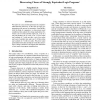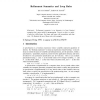1549 search results - page 10 / 310 » On the rules of intermediate logics |
FLAIRS
2003
13 years 10 months ago
2003
Data mining is the process of extracting implicit, previously unknown, and potentially useful information from data in databases. It is widely recognized as a useful tool for deci...
JAIR
2007
13 years 8 months ago
2007
We report on a successful experiment of computeraided theorem discovery in the area of logic programming with answer set semantics. Specifically, with the help of computers, we d...
ICCCN
1998
IEEE
14 years 1 months ago
1998
IEEE
We consider multihop communications on optical torus networks with time
FM
1999
Springer
14 years 1 months ago
1999
Springer
Refinement semantics is an alternative to least fixpoint semantics that is more useful for programming. From it we derive a variety of rules for w h i l e-loops, for-loops, and loo...
ENTCS
2006
13 years 8 months ago
2006
Parkinson, Bornat, and Calcagno recently introduced a logic for partial correctness in which program variables are treated as resource, generalizing earlier work based on separati...


